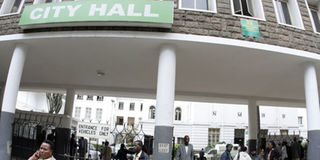Auditors reveal rot at City Hall

FILE | NATION
City Hall. A report by external auditors has implicated top officials in corrupt deals that have fleeced the council.
What you need to know:
- Report handed to House team claims that approved tender prices were much higher than market rates
External auditors have accused top City Hall officials of interfering with a forensic audit of City Council of Nairobi (CCN) debts, leading to payments of unverified claims.
“A lot of interest was shown by some City Hall officials and councillors in what the consultants were doing, which interfered with our work,” says a report by Wachira Irungu and Associates.
The auditors said the officials, who were the contact persons for the audit, showed preferences for some creditors to be verified for approval of payment ahead of others.
The report containing the allegations was handed to Parliament’s Local Authorities and Funds Account Committee by Town Clerk Tom Odongo two weeks ago. The committee is chaired by Wundanyi MP Thomas Mwadeghu.
The committee investigated the controversial Sh5 billion Equity Bank loan the council took to offset its statutory debts as well as other debtors and is due to table its findings for adoption by the House before going on recess next week.
The audit conducted between February and April this year shows that the council owed Sh2.4 billion, out of which Sh1.3 billion had been paid.
The report also reveals that a number of claims by law firms were not genuine as there was no evidence that they had handled any brief for the council.
In particular, the auditors singled out the disappearance of vouchers and subsequent payment of Sh4.9 million to Cami Contractors before the firm was cleared by auditors.
“We noted some instances where tender prices were significantly higher than the market price to justify the award of the tender. Despite this discrepancy, the tenders were approved as the lowest,” the audit report says.
Cami Contractors had been contracted by the council to supply seven water tanks to various rehabilitation centres at a price of Sh700,000 per tank yet the average market price was Sh65,000.
The auditors found that the tanks supplied were of 8,000 litres instead of 10,000 litres ordered, resulting in over-pricing by Sh4.4 million.
Site verification proved that the prices Cami had quoted were almost 10 times the market price. However, the vouchers for payment were approved outside the council’s laid down creditors’ verification and payment system.
They were then “sneaked” into the Electronic Funds Transfer forms and paid despite the auditors’ efforts to stop the irregular transaction.
This story was first published in the Business Daily on Jamhuri Day




